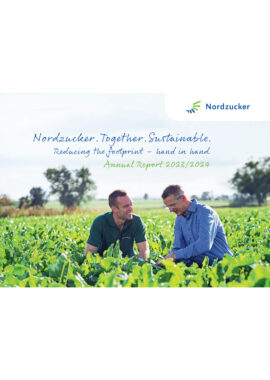
Nordzucker Post 01/2021 - 28 January 2021
Our commitment to the climate
Nordzucker is already setting standards in terms of energy consumption and CO₂ emissions and is exceeding the legal requirements: Since 1990, energy consumption in sugar production from beets has fallen by 40 percent, and CO₂ emissions have been reduced by 60 percent.
We need heat, and therefore energy, to evaporate the sugar beet’s approximately 75 percent water and crystallize the sugar. Our power plants, which use gas, oil or coal to process sugar beet, produce steam that is used to generate electricity via a turbine and is then used several times in the evaporation and cooking process. This cogeneration process is particularly efficient. At over 85 percent, the efficiency of energy utilization is significantly better than that of conventional power plants (maximum 50 percent). The Group already uses mainly natural gas as an energy source, which emits only about half the CO₂ of coal and oil.
From today’s perspective, however, this is not enough to protect the climate. That’s why our clear goal is:
Phase out coal by 2030 – CO₂ neutrality by 2050 at the latest.
Our “Go Green” program to convert all our plants to renewable energies is now in the start-up phase – the idea generation phase. Potential of possible technologies and their applicability in our plants are currently being examined and evaluated. Promising technologies will then be tested in actual production. Groupwide implementation requires substantial investment.
One new and promising technology is a mechanical vapor compressor. The higher steam is compressed, “stressed,” the more energy it contains. This technology for compressing steam results in higher electricity requirements, but at the same time saves three to four times the amount of fresh steam.
A few years ago, the introduction of evaporation dryers also led to higher electricity requirements, but at the same time drastically reduced overall heat and thus energy needs. This shows how Nordzucker successfully implemented investments in environmentally friendly technologies at an early stage.


